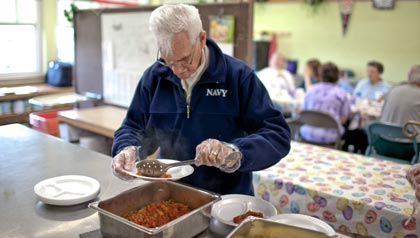AARP Hearing Center
Governor's proposal would eliminate 240,000 meals
by: Jean McMillan Lang

Joe MacFarlane, 76, prepares to serve lunch at the senior center in Weymouth. Gov. Deval Patrick wants to trim the agency’s budget that pays for community lunches and home-delivered meals.
Join AARP Today — Receive access to exclusive information, benefits and discounts.
Shirley MacFarlane has lunch at the senior center in Weymouth twice a week, where she chats with friends.
"If I eat this now, then I just have a sandwich later," said MacFarlane, 73.
Her husband, Joe, 76, a retired Navy engineer, is one of the volunteers who serve the meals before sitting down to eat their own.
Sign up for the AARP Health Newsletter.
Join AARP Today — Receive access to exclusive information, benefits and discounts.
The MacFarlanes are among those concerned about Gov. Deval Patrick's (D) proposed 24 percent reduction in the Elderly Nutrition Program. The $1.5 million cut would eliminate more than 240,000 free or subsidized lunches for seniors.
The Elderly Nutrition Program provides more than 8.5 million meals each year to people 60 and older. Meals are served at more than 400 community centers and are delivered to older people in their homes. The program is paid for with state and federal money; voluntary donations of about $2 per meal are requested of people who can afford it.
"We have more than a billion dollars in the state's rainy day fund, and we can't spare $1.5 million of that to protect these meals?'' asked Deborah Banda, AARP Massachusetts state director. "That's a sad value judgment."
Banda said if older people who have lunch at community centers do not get these meals, they may require more medical care because of poor nutrition and isolation, and the expense would be much more than the amount Patrick wants to cut.
"We think it's extremely shortsighted and, frankly, it's very coldhearted," Banda said.
The House and Senate will reconcile their versions of the state's 2013 budget with the goal of submitting legislation for Patrick to sign by the start of the fiscal year on July 1.
House and Senate leaders said the state's older population is a priority, but they could not say whether the legislature will reject Patrick's proposed cut.
"The Elderly Nutrition Program provides seniors in Massachusetts with the help they need to maintain their independence, stay connected to the community and, most importantly, stay healthy," Senate President Therese Murray (D-Plymouth) said in a statement. "We are facing a possible gap of approximately $1.6 billion in the budget this year, but it continues to be my priority, and a priority of the Senate, to ensure that we preserve services for our neediest citizens and that no one program or line item is disproportionately cut."
House Speaker Robert A. DeLeo (D-Winthrop) said, "While we face another very tough budget and can't make any promises, as always, we will do the best we can to protect our seniors."
Hunger among 60+
According to the U.S. Food and Nutrition Service, about 190,000 Massachusetts residents 60 and older have incomes low enough to qualify them for financial aid to buy groceries .
Laurel Rancitelli, director of the Pine Point Senior Center in Springfield, said her center serves lunch five days a week. A voluntary donation of $1.75 is requested.
On Valentine's Day, 46 people came to Pine Point for a turkey dinner with gravy, cranberry sauce, potatoes, mixed vegetables and dessert.
Rancitelli said some come because of financial reasons, but others come to socialize or because physical limitations make meal preparation difficult.
"There's a real need,'' she said.
"Meals are a huge part of someone's day," said Patricia Baker, an analyst for the Massachusetts Law Reform Institute. "They are overlooking some of the broader issues of health and activity that the meals provide."
She said the cut would be shortsighted; in a proposed budget of $32.3 billion, $1.5 million is "budget dust." Baker said it would be difficult for any location to turn seniors away and warned that the quality of meals might suffer as providers try to stretch their dollars.
To learn more, visit aarp.org/ma . To ask your state legislator to protect the Elderly Nutrition Program, call 1-888-259-9789 toll-free.
You may also like: Fighting for 50+ Bay State residents.
Jean McMillan Lang is a writer living in Milton, Mass.































































